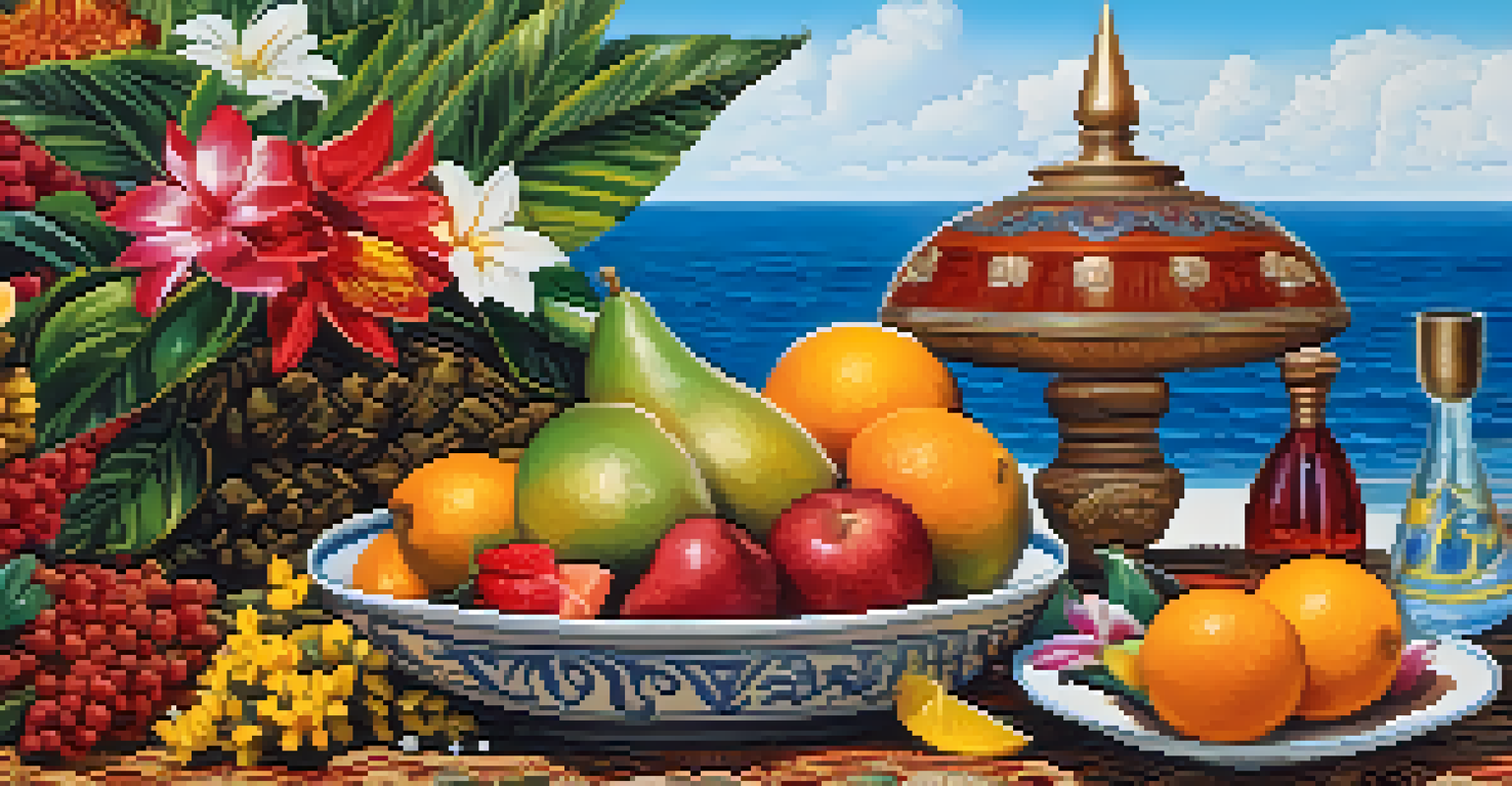Festa de Iemanjá: A Beautiful Tribute to the Sea Goddess

Understanding Iemanjá: The Sea Goddess
Iemanjá is a revered deity in Afro-Brazilian religions, symbolizing motherhood and the sea. Often depicted as a beautiful woman, she embodies the nurturing qualities of the ocean, providing sustenance and protection to her devotees. Her essence is deeply woven into Brazilian culture, where she is celebrated for her loving and maternal nature.
The sea, once it casts its spell, holds one in its net of wonder forever.
Many people believe that Iemanjá has the power to grant wishes, making her a central figure in personal rituals and community celebrations. Her connection to the sea reflects the importance of water in life and spirituality, highlighting the balance between nature and humanity. As the protector of fishermen and sailors, she is often invoked for safe journeys and bountiful catches.
The celebration of Iemanjá transcends mere worship; it is a cultural phenomenon that unites people from various backgrounds. Through her, followers find a sense of identity and belonging, which is crucial in a diverse society. As we delve deeper into the Festa de Iemanjá, we uncover the layers of meaning behind this vibrant tribute.
The Origins of Festa de Iemanjá
Festa de Iemanjá roots back to African traditions brought to Brazil by enslaved people. These customs merged with local beliefs, giving rise to a unique celebration that honors the sea goddess. The festival typically takes place on February 2nd, coinciding with the feast day of Iemanjá in the Yoruba religion.

Over the years, the festival has evolved, incorporating elements from different cultures while maintaining its core essence. The event is particularly vibrant in cities like Salvador, Bahia, where thousands gather to pay homage to Iemanjá. This blend of African, indigenous, and Portuguese influences showcases Brazil’s rich cultural tapestry.
Iemanjá: Mother of the Sea
Iemanjá is a revered goddess symbolizing motherhood and the sea, embodying nurturing qualities and providing protection to her followers.
The festival serves as a reminder of the resilience and creativity of marginalized communities. By celebrating Iemanjá, participants honor their ancestors and preserve their cultural heritage, ensuring that these traditions continue for future generations.
Rituals and Offerings at the Festival
During the Festa de Iemanjá, devotees prepare elaborate offerings known as 'fitas' made of flowers, perfumes, and foods that represent the goddess's favorite items. These offerings are placed in beautifully decorated boats or released into the sea, symbolizing a heartfelt connection between the worshippers and Iemanjá. The act of casting these offerings into the ocean is both a gesture of gratitude and a request for blessings.
We do not inherit the earth from our ancestors; we borrow it from our children.
The ocean plays a crucial role in the rituals, acting as a bridge between the material and spiritual worlds. As the waves carry the offerings away, devotees believe that their intentions are conveyed to Iemanjá. This connection fosters a sense of community, as families and friends come together to celebrate and support one another in their spiritual journeys.
In addition to offerings, the festival features music, dance, and vibrant parades that fill the streets with joy and color. Participants often dress in white, symbolizing purity and peace, creating a striking visual display against the backdrop of the ocean. These festivities highlight the importance of unity and shared beliefs in celebrating Iemanjá.
The Significance of the Sea in Brazilian Culture
The sea holds profound significance in Brazilian culture, representing both physical and spiritual nourishment. It is a source of sustenance for many coastal communities, highlighting the deep connection between people and the ocean. This relationship is celebrated in various artistic forms, from music and dance to visual arts, reflecting the sea's impact on everyday life.
In the context of Festa de Iemanjá, the ocean becomes a sacred space, where people gather to honor their goddess and seek her blessings. The waves carry not just offerings, but also the hopes and dreams of those who believe in her power. This spiritual connection emphasizes the importance of respecting and protecting the natural environment.
Festa de Iemanjá's Cultural Roots
The festival celebrates Iemanjá's significance, merging African traditions with local customs to honor the goddess and preserve cultural heritage.
Additionally, the sea serves as a metaphor for life's ebb and flow, encapsulating themes of change, resilience, and renewal. Just as the tides rise and fall, so too do the journeys of the people who revere Iemanjá, reminding everyone of their shared experiences and collective struggles.
Modern Celebrations of Festa de Iemanjá
In recent years, the Festa de Iemanjá has expanded beyond its traditional roots, attracting a diverse audience that includes tourists and locals alike. Its appeal lies in the vibrant atmosphere, rich cultural heritage, and the sense of community it fosters. As more people participate, the festival continues to evolve while honoring its origins.
Modern celebrations often feature performances by renowned musicians and artists, creating a lively ambiance that draws in crowds. Food stalls offering delicious local cuisine add to the festive experience, making it a feast for the senses. This blend of tradition and contemporary culture enriches the festival, allowing it to resonate with younger generations.
Social media has also played a significant role in promoting the festival, helping to share its beauty and significance with a global audience. Hashtags and live streams connect people from around the world, allowing them to experience the joy and reverence of Festa de Iemanjá, even from afar.
Environmental Awareness and Iemanjá
As the celebration of Iemanjá continues to grow, so does the awareness of environmental issues affecting the oceans. Many participants are increasingly mindful of their impact, incorporating eco-friendly practices into their offerings. This shift reflects a broader movement towards sustainability and respect for nature, emphasizing the interconnectedness of spirituality and environmental stewardship.
Conversations around pollution and ocean conservation have become integral to the festival, as worshippers recognize the need to protect the goddess's domain. Initiatives such as beach cleanups and educational workshops are becoming common, encouraging participants to take action in preserving the marine environment. This newfound focus demonstrates a commitment to both Iemanjá and the planet.
Growing Focus on Sustainability
As the festival evolves, participants increasingly emphasize environmental awareness and sustainable practices in their celebrations for Iemanjá.
In this way, the festival serves as a platform for raising awareness about environmental issues, inspiring a collective responsibility towards the ocean and its inhabitants. By honoring Iemanjá through sustainable practices, devotees ensure that future generations can continue to celebrate and connect with the sea goddess.
The Future of Festa de Iemanjá
As we look to the future, the Festa de Iemanjá is poised to remain a significant cultural event, adapting to the changing times while honoring its rich heritage. The festival's ability to unite people across generations and backgrounds ensures its continued relevance in Brazilian society. By embracing both tradition and modernity, it appeals to a wide audience, fostering a sense of belonging.
The integration of contemporary issues, such as environmentalism and social justice, will likely shape the future celebrations. These themes resonate deeply with younger generations, who seek meaningful connections to their cultural roots. As the festival evolves, it may become a powerful platform for advocacy and awareness, encouraging a greater appreciation for the ocean.

Ultimately, the future of Festa de Iemanjá lies in its capacity to inspire love and respect for the sea goddess and the environment she embodies. Through ongoing celebrations, the spirit of Iemanjá will continue to thrive, reminding us all of the beauty and importance of our shared world.